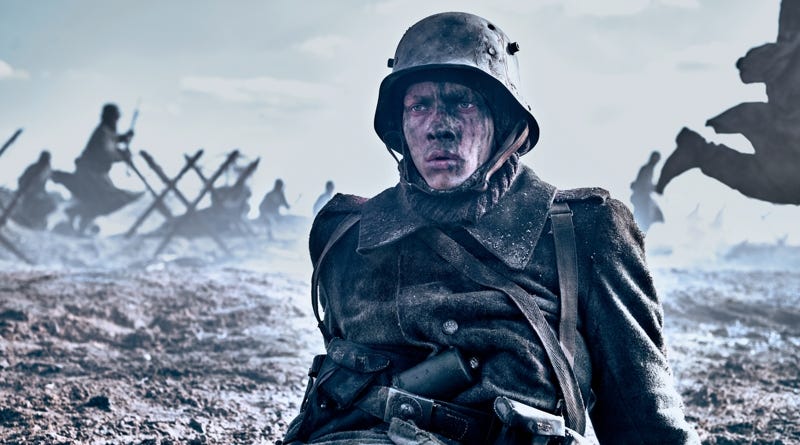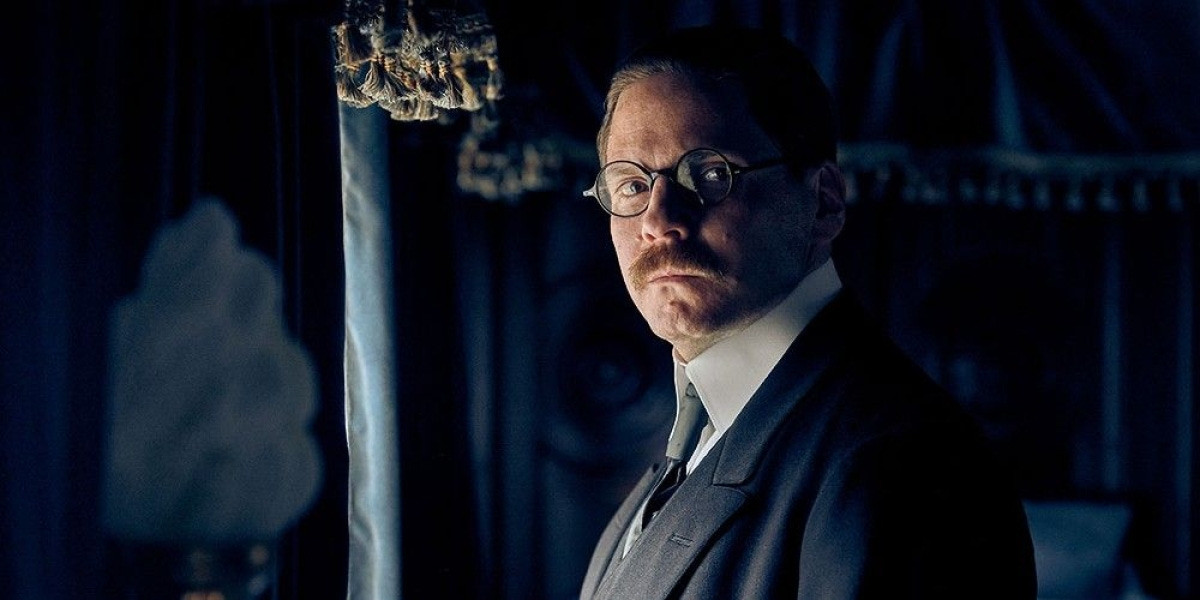All Quiet on the Western Front (2022)
War is hell. In this movie we discover that we all need reminding.
All Quiet on the Western Front (2022)
Streaming on Netflix and in theaters
Paul faces horrors within and without in All Quiet on the Western Front
This is a stinging adaptation of Erich Maria Remarque’s world famous 1929 novel (filmed to wide acclaim in 1930 by Lewis Milestone and again in 1979, both American productions).
Filmed this time by German filmmakers from a distinctly German point of view, this becomes not just an adaptation of the novel but a re-imagining. War wasn’t just hell, the movie says.
It powerfully suggests, as perhaps only these German artists could dare, that sending young men to be slaughtered led to a collapse of Germany’s moral sensibility.
That’s certainly not a new contention. But making that case, even beyond depicting the sheer horror of mass killing, is what’s actually driving the narrative here.
Like the novel, the movie begins in 1917 and follows Paul Bäumer (Felix Kammerer) and his four eager compatriots. Three of them are young: Tjaden (Eden Hasanovic), Müller (Moritz Klaus) and Albert (Aaron Hilmer). The older Kat (Albrecht Schuch), an illiterate cobbler, wants a chance at glory and, wily in the ways of human hypocrisy, becomes a mentor to the naive Paul.
They’re all giddy at the notion of trouncing the French, as well as any English and American forces foolish enough to challenge the German juggernaut.
But as the pointless slaughter rages on, with the front moving back and forth between two armies, advancing less than a few hundred meters in either direction, the absurdly small shift in French and German positions becomes appallingly meaningless.
As in the novel, we and the young combatants at first don’t understand the scale of the war’s strategic folly as well as the lies the soldiers are being told. The prospects for German soldiers are already staggeringly bleak, but Paul and his friends can’t be told the truth.
The battlefield’s vast despair and theater-wide descent into depravity — millions of lives sacrificed for nothing — are quite beyond Paul’s youthful imagining,
Fighting in uniform, bayonet at the ready, seems to fill these men’s ordinary lives with promise. With the jingoistic bombast of politicians ringing in their ears, they merrily repeat the popular Fatherland sentiment that has them “marching on Paris in four months”.
They proudly call each other “comrade”. Paul will even be called that by an enemy French soldier pleading for his life during the conflict’s savage final assault.
The novel’s underlying pacifism, as horrors mount, isn’t what you most urgently feel as you watch. The movie makes its anti-war sentiments live in the head more than the heart. It gets you wondering how such hideous loss of life could have been not just committed but ordered. It takes a while to ask the harder question: why?
The movie eventually turns the question into an accusation: German leadership had lost its moral compass, stoking its young men not with ideals but nothing more than, as Bernard Shaw acidly put it in Man and Superman, “hot blood and the knowledge that it’s more dangerous to lose than to win.”
Undeniably, this starkness created cold killers on both sides of the conflict. But the director, Edward Berger, and his co-screenwriters, Lesley Paterson and Ian Stokell, aim their scathing attack directly at the German war machine.
Trench warfare, idiotically stationary as a war tactic, made massive death integral. It sent men to be poisoned with gas, set aflame, crushed under the wheels of tanks, and national shame resulted only because Germany lost.
Remarque mocked generals but kept them largely offstage. Young men’s pointless agony was more than enough to convince readers that the generals were cozened, deskbound fools.
Here, the subject has morphed from war’s folly into the German nationalist arrogance that unleashed the country’s warmongers. Millions of corpses did not satisfy their lust.
Trench warfare, idiotically stationary as a war tactic, made massive death integral. It sent men to be poisoned with gas, set aflame, crushed under the wheels of tanks, and national shame resulted only because Germany lost.
Daniel Bruhl is a German diplomat seeking peace in All Quiet on the Western Front
The entire second half of the movie covers only four days, November 8 to armistice day, November 11, 1918. In this tight timeframe we see the mortified, deeply ashamed German diplomat Matthias Erzberger (played with moving dignity by Daniel Bruhl), trying to save Germany face by offering a complete surrender to the French command.
But the French will settle for nothing less than Germany’s abject admission of wrong, as if the French hadn’t also committed massive atrocities.
These crisply wrought scenes aren’t in Remarque’s novel. Nor is the last-minute, utterly futile attack on the French by a fanatical German commander. (This outrage is an invention; in fact, forces on both sides did some fighting up until the minute the armistice went into effect.)
But at the end the fact remains: there may at last be quiet, but there’s no glory, on the Western Front.
Kammerer gives an increasingly bewildered, devastating performance as Paul. The actor is living out the story, not hiding the grotesquerie of Paul’s transformation. The stark steps in his disillusionment and dehumanization are portrayed with unsparing accuracy.
Paul is our only reliable moral compass, as Kammerer’s slowly deadened gaze teaches us.
James Friend’s cinematography shifts moment to moment from chilling to mercilessly hot. Its gruesome shots burn. At the same time, its bleakness never lets you forget the galling truth: war has to be made to seem acceptable but never in its smallest incidents actually is.
Volker Bertelmann’s haunting score keeps us off balance with its dissonances, occasionally blaring horns and somber pauses. It makes both stolen moments of tenderness and unrelenting savagery impossible to ignore. War throws onlookers, citizens like us in the audience, into conflict, too.
This movie needs to be seen. War’s folly has still not been renounced, down to this hour in Ukraine. That conflict will surely cross your mind as you watch here. Would that it could stop the war. No movie has managed to do that yet. Good, then, for movie makers like the ones here who refuse to look away.





